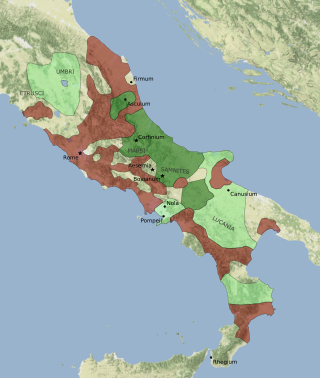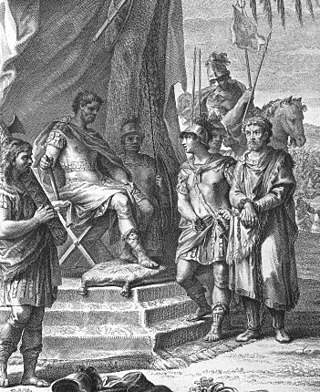Related Research Articles

Marcus Licinius Crassus was a Roman general and statesman who played a key role in the transformation of the Roman Republic into the Roman Empire. He is often called "the richest man in Rome".

This article concerns the period 109 BC – 100 BC.
Year 90 BC was a year of the pre-Julian Roman calendar. At the time it was known as the Year of the Consulship of Caesar and Lupus and the Third Year of Zhenghe. The denomination 90 BC for this year has been used since the early medieval period, when the Anno Domini calendar era became the prevalent method in Europe for naming years.

Gaius Marius was a Roman general and statesman. Victor of the Cimbric and Jugurthine wars, he held the office of consul an unprecedented seven times.

Lucius Cornelius Sulla Felix, commonly known as Sulla, was a Roman general and statesman. He won the first large-scale civil war in Roman history and became the first man of the Republic to seize power through force.

The Social War, also called the Italian War or the Marsic War, was fought largely from 91 to 87 BC between the Roman Republic and several of its autonomous allies in Italy. Some of the allies held out until 87 BC.
Gnaeus Pompeius Strabo was a Roman general and politician, who served as consul in 89 BC. He is often referred to in English as Pompey Strabo, to distinguish him from his son, the famous Pompey the Great, or from Strabo the geographer.
Publius Rutilius Rufus was a Roman statesman, soldier, orator and historian of the Rutilia gens, as well as a great-uncle of Gaius Julius Caesar. He achieved the highest political office in the Roman Republic when he was elected consul in 105 BC.

The Battle of Vercellae, or Battle of the Raudine Plain, was fought on 30 July 101 BC on a plain near Vercellae in Gallia Cisalpina. A Germanic-Celtic confederation under the command of the Cimbric king Boiorix was defeated by a Roman army under the joint command of the consul Gaius Marius and the proconsul Quintus Lutatius Catulus. The battle marked the end of the Germanic threat to the Roman Republic.

The Battle of the Muthul was fought at the Muthul River in Numidia in 109 BC. The Numidians, led by their king Jugurtha, fought a Roman army commanded by the consul Quintus Caecilius Metellus Numidicus. The battle was fought during the Jugurthine War, a war between King Jugurtha of Numidia and the Roman Republic. The battle was indecisive - it took the Romans four more years to defeat Jugurtha who was captured by Lucius Cornelius Sulla in 105 and executed during Marius' Triumphal parade a year later (104). The Roman historian Publius Rutilius Rufus distinguished himself during the battle, while Gaius Marius' military genius shone through for the first time, saving the day for the Romans.
Publius Servilius Vatia Isauricus, was a politician and general of the Roman Republic and a member of the patrician gens Servilii. He was elected consuls for 79 BC with Appius Claudius Pulcher as his consular collegae. From 78 to 74 BC, as proconsul of Cilicia, he fought against the Cilician Pirates and Isaurian hill tribes in Asia Minor. He was granted the agnomen Isauricus for his victories over the Isaurians. Upon returning to Rome he celebrated a triumph for his victories.
Lucius Julius Caesar was a Roman statesman and general of the late 2nd and early 1st centuries BC. He was involved in the downfall of the plebeian tribune Lucius Appuleius Saturninus in 100 BC. He was consul of the Roman Republic in 90 BC during the Social War. During the war he commanded several Roman legions against the Italian Allies. He was awarded a Triumph for his victories on the Samnites at Acerrae.
Quintus Servilius Caepio was a Roman patrician, statesman and soldier. He was the son of Quintus Servilius Caepio who was consul in 106 BC and who lost his army during the Battle of Arausio. He was elected praetor some time in the last 90s BC and fought for Rome during the Social War. He was killed in the second year of the war while fighting the Marsi by Quintus Poppaedius Silo.
Sulla's civil war was fought between the Roman general Lucius Cornelius Sulla and his opponents, the Cinna-Marius faction, in the years 83–81 BC. The war ended with a decisive battle just outside Rome itself. After the war the victorious Sulla made himself dictator of the Roman Republic.
This article concerns the period 99 BC – 90 BC.

Lucius Porcius Cato was a Roman general and politician who became consul in 89 BC alongside Gnaeus Pompeius Strabo. He died at the Battle of Fucine Lake, possibly at the hands of Gaius Marius the Younger.
The gens Rutilia was a plebeian family at ancient Rome. Members of this gens appear in history beginning in the second century BC. The first to obtain the consulship was Publius Rutilius Rufus in 105 BC.
Titus Vettius Scato was an Italian rebel commander, a general of the Marsi during the Social War. At the Battle of the Tolenus River Scato and the Marsi ambushed the Roman consul, Publius Rutilius Lupus after the Romans crossed the River Tolenus. Unfortunately for Scato, Rutilius's senior legate, Gaius Marius, and his division were operating separately from Rutilis and crossed the river downstream of the battle, captured the Marsi camp, and then attacked the Marsi while they were still fighting Rutilius's army, routing them with heavy losses. He defeated Lucius Julius Caesar in battle before marching on and capturing Aesernia. When he encountered an army under Pompey Strabo, instead of fighting, the two met, their armies treating each other without hatred. According to Seneca, he was captured by the Romans but was stabbed to death by his slave rather than face the ignominy of defeat.

The Battle of the Tolenus River was fought on 11 June 90 BC between the Roman Republic, led by the consul Publius Rutilius Lupus, and an army of Marsian Rebels commanded by Titus Vettius Scato. The battle was part of the Social War and resulted in a major defeat for the Romans.
References
- ↑ Matyszak, Philip (2014). Cataclysm 90 BC: The Forgotten War That Almost Destroyed Rome. Pen and Sword. pp. 81–93. ISBN 978-1-84884-789-7.
- ↑ Telford, Lynda (2014). Sulla: A Dictator Reconsidered. Pen and Sword. pp. 87–88. ISBN 978-1-78303-048-4.
- ↑
 Smith, William, ed. (1870). "Lupus, Rutilius 1.". Dictionary of Greek and Roman Biography and Mythology . Vol. 2.
Smith, William, ed. (1870). "Lupus, Rutilius 1.". Dictionary of Greek and Roman Biography and Mythology . Vol. 2.